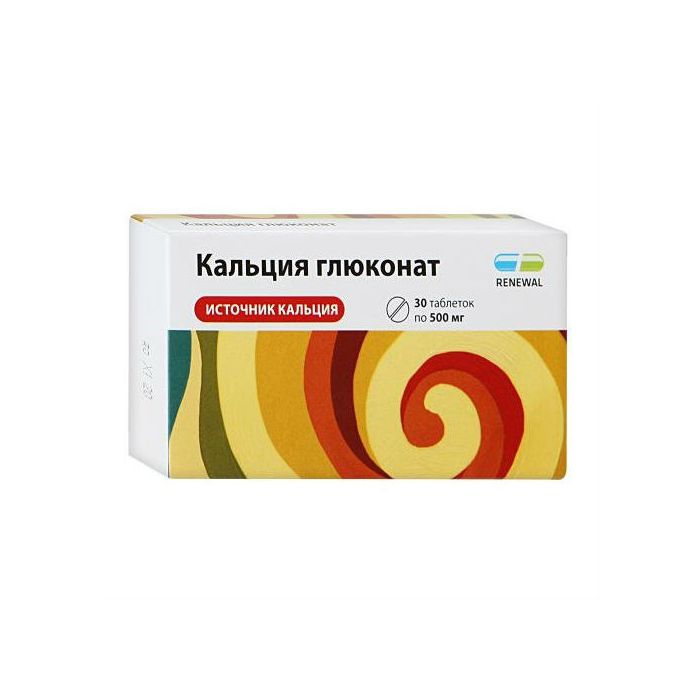calcium gluconate | Calcium gluconate tablets 500 mg Renewal 30 pcs.
Special Price
$26
Regular Price
$33
In stock
SKU
BID470635
Topical release
tablets 500 mg
tablets 500 mg
Topical release
tablets 500 mg
Packing
30 pcs.
Pharmacological action
Calcium - a macrocell involved in the formation of bone tissue, the process of blood coagulation, is necessary to maintain stable cardiac activity, processes of transmission of nerve impulses.
Improves muscle contraction during muscular dystrophy, myasthenia gravis, and reduces vascular permeability.
When iv is administered, calcium causes excitation of the sympathetic nervous system and increased adrenaline excretion of adrenaline has a moderate diuretic effect.
Indications
Hemorrhoids of the 1st and 2nd degree, anal fissures, acute and chronic anal eczema, inflammatory processes in the rectum (proctitis).p Hypocalcemia of various origins, hypoparathyroidism, parenchymal hepatitis, toxic liver damage, nephritis, eclampsia, hyperkalemic form of paroxysmal myoplegia, inflammatory and exudative processes, skin diseases.
As an additional tool in the treatment of allergic diseases and drug allergies.
As an additional hemostatic agent for pulmonary, gastrointestinal, nasal, uterine bleeding.
As an antidote for poisoning with magnesium salts, oxalic acid and its soluble salts.
Contraindications
Hypercalcemia, severe hypercalciuria, severe renal failure, tendency to thrombosis, hypersensitivity to calcium gluconate.
Special instructions
Caution is used in patients with slight hypercalciuria, with minor impaired renal function or with urolithiasis with a history of
in these cases, the level of urinary calcium excretion should be regularly monitored.
Patients with a tendency to form calculi in the urine are advised to increase their fluid intake.
Composition 1 tablet contains calcium (as calcium carbonate - 1.250 g) 500 mg
colecalciferol (Vitamin D3) 200 IU in the form of a granulate containing:
colecalciferol,
butylhydroscitoluene,
sucrose,
gelatin,
sodium aluminosilicate,
triglyceridelp ,
low-molecular weight polyvinylpyrrolidone (povidone),
potato starch,
vivasol (croscarmellose sodium),
citric acid,
aspartame, magnesium stearate,
flavoring orange fruit 1 tablet INH 500mg calcium gluconate.
Dosage and administration of
For oral administration, a single dose is 1-3 g, the frequency of administration is 2-3 times / day.
Side effects
Nausea, vomiting, diarrhea, bradycardia.
Drug Interactions
Pharmaceutically incompatible with ethanol, carbonates, salicylates, sulfates (forms insoluble or sparingly soluble Ca 2+ salts).
Forms insoluble complexes with tetracycline antibiotics (reduces antibacterial effect). With simultaneous use with quinidine, it is possible to slow intraventricular conduction and increase the toxicity of quinidine.
Slows down the absorption of tetracyclines, digoxin, oral iron preparations (the interval between their doses should be at least 2 hours).
When combined with thiazide diuretics, it can enhance hypercalcemia, reduce the effect of calcitonin in hypercalcemia, and reduce the bioavailability of phenytoin.
Overdose
Symptoms: the development of hypercalcemia.
Treatment: calcitonin, intravenously at the rate of 5-10 ME / kg / day (the drug is diluted in 500 ml of 0.9% sodium chloride solution, administered dropwise for 6 hours).
Storage conditions
In a dark place.
Expiration
Expiration is 5 years. Do not use after the date stated on the package.
active substance
Calcium gluconate
lekarstvennaja form
tablets
Upgrading PFC, Russia
tablets 500 mg
Packing
30 pcs.
Pharmacological action
Calcium - a macrocell involved in the formation of bone tissue, the process of blood coagulation, is necessary to maintain stable cardiac activity, processes of transmission of nerve impulses.
Improves muscle contraction during muscular dystrophy, myasthenia gravis, and reduces vascular permeability.
When iv is administered, calcium causes excitation of the sympathetic nervous system and increased adrenaline excretion of adrenaline has a moderate diuretic effect.
Indications
Hemorrhoids of the 1st and 2nd degree, anal fissures, acute and chronic anal eczema, inflammatory processes in the rectum (proctitis).p Hypocalcemia of various origins, hypoparathyroidism, parenchymal hepatitis, toxic liver damage, nephritis, eclampsia, hyperkalemic form of paroxysmal myoplegia, inflammatory and exudative processes, skin diseases.
As an additional tool in the treatment of allergic diseases and drug allergies.
As an additional hemostatic agent for pulmonary, gastrointestinal, nasal, uterine bleeding.
As an antidote for poisoning with magnesium salts, oxalic acid and its soluble salts.
Contraindications
Hypercalcemia, severe hypercalciuria, severe renal failure, tendency to thrombosis, hypersensitivity to calcium gluconate.
Special instructions
Caution is used in patients with slight hypercalciuria, with minor impaired renal function or with urolithiasis with a history of
in these cases, the level of urinary calcium excretion should be regularly monitored.
Patients with a tendency to form calculi in the urine are advised to increase their fluid intake.
Composition 1 tablet contains calcium (as calcium carbonate - 1.250 g) 500 mg
colecalciferol (Vitamin D3) 200 IU in the form of a granulate containing:
colecalciferol,
butylhydroscitoluene,
sucrose,
gelatin,
sodium aluminosilicate,
triglyceridelp ,
low-molecular weight polyvinylpyrrolidone (povidone),
potato starch,
vivasol (croscarmellose sodium),
citric acid,
aspartame, magnesium stearate,
flavoring orange fruit 1 tablet INH 500mg calcium gluconate.
Dosage and administration of
For oral administration, a single dose is 1-3 g, the frequency of administration is 2-3 times / day.
Side effects
Nausea, vomiting, diarrhea, bradycardia.
Drug Interactions
Pharmaceutically incompatible with ethanol, carbonates, salicylates, sulfates (forms insoluble or sparingly soluble Ca 2+ salts).
Forms insoluble complexes with tetracycline antibiotics (reduces antibacterial effect). With simultaneous use with quinidine, it is possible to slow intraventricular conduction and increase the toxicity of quinidine.
Slows down the absorption of tetracyclines, digoxin, oral iron preparations (the interval between their doses should be at least 2 hours).
When combined with thiazide diuretics, it can enhance hypercalcemia, reduce the effect of calcitonin in hypercalcemia, and reduce the bioavailability of phenytoin.
Overdose
Symptoms: the development of hypercalcemia.
Treatment: calcitonin, intravenously at the rate of 5-10 ME / kg / day (the drug is diluted in 500 ml of 0.9% sodium chloride solution, administered dropwise for 6 hours).
Storage conditions
In a dark place.
Expiration
Expiration is 5 years. Do not use after the date stated on the package.
active substance
Calcium gluconate
lekarstvennaja form
tablets
Upgrading PFC, Russia
Submit your review to Earn 10 Reward Points click here to login
Write Your Own Review

